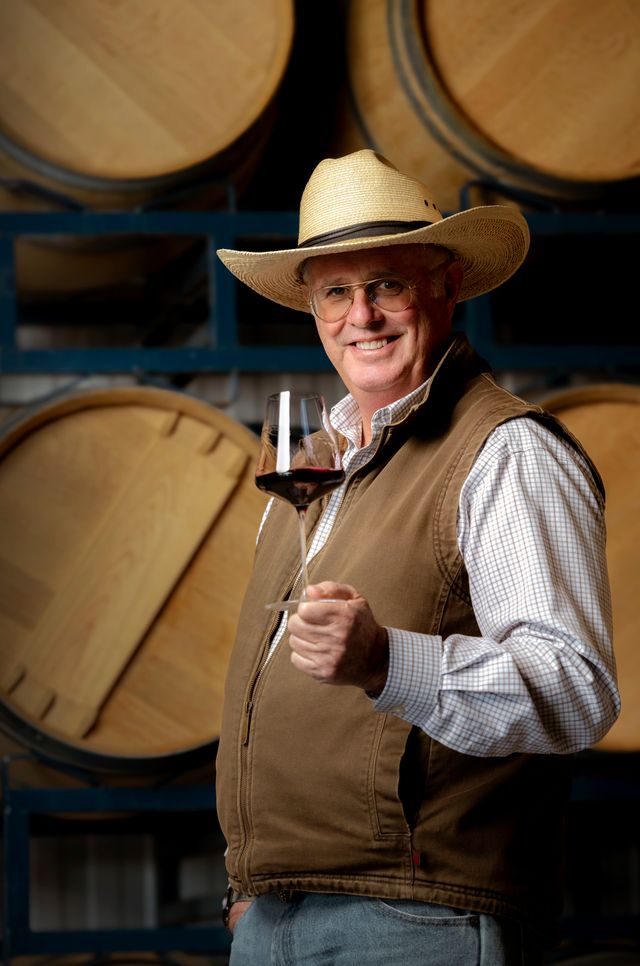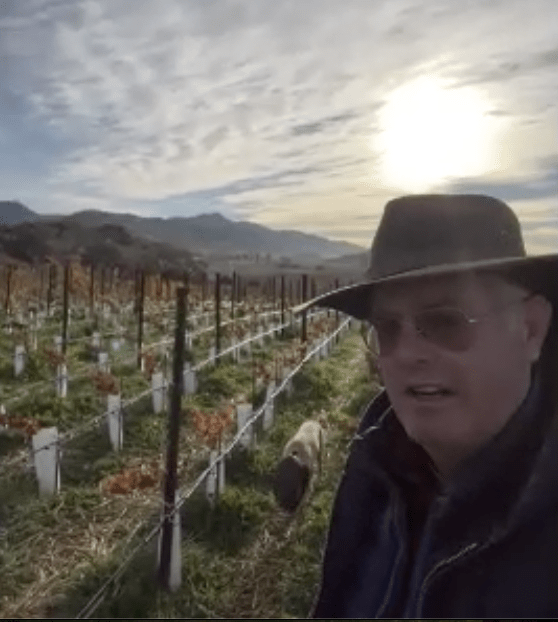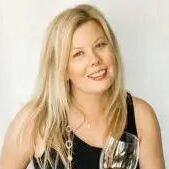In the spirit of #ComeOverOctober, I have another story to share from one of the people who bring us together through the wine in our glasses…
In the rolling hills of Napa Valley, where Cabernet Sauvignon vines stretch toward distant mountains, the story of Gamble Estates unfolds as both a tale of agricultural tradition and thoughtful business evolution. Speaking on Zoom during an early morning walk through his vineyard, Tom Gamble founder and vigneron shared with me the story of a journey that began with a childhood fist fight over who would work the farm to one that has grown into a wine business spanning four distinct Napa Valley appellations: Oakville, Yountville, Mount Veeder, and Rutherford..

From Childhood Dreams to Agricultural Reality
“When my brother and I were about nine or 10 years old, we got in a fist fight about who was going to be the farmer and who was going to have to work in the office,” he recalls with a laugh. That early passion for the land has defined a lifetime of agricultural pursuits, from his first vineyard venture at 18 to today’s boutique winery operation.
As a third-generation Napa Valley farmer his path wasn’t without lessons in financial reality. As a college freshman, he and fellow “farm kids” pooled their money to buy a hops field in Russian River Valley, converting it to pinot noir and chardonnay.
“We landed a contract with Piper Sonoma to sell the grapes for sparkling wine, which meant the grapes could be harvested in August so we could get back to school. We would all take classes on Tuesday and Thursday so we had more time to work the land. But then we got ourselves into trouble. We took out a variable interest rate loan with no income coming in yet, and Paul Volcker was trying to tame inflation. At one point we were paying 13 percent interest. We gave up our apartment, slept in our pickups for a while. It was just the thing to do in your early 20’s. Today, I have plenty of loans but they’re all at a fixed rate.”
A Different Approach to Napa Winemaking
After years focused on vineyard management, the transition to winemaking came from both practical and philosophical motivations. “The land valuation was growing faster than a farmer’s income could justify buying more land,” he explains. “I realized that not all of [the next generation] thought farming was as cool as I did. Fortunately, I love wine so turning a perishable crop into something that’s not perishable interested me. So, I started on the adventure of making and selling the wine, with selling it being the hardest part.”
The decision to add value through winemaking led to what he describes as an “against the grain” approach to Napa wine production. While the region became known for big, blockbuster wines, Gamble Estates has consistently pursued a lighter, more elegant style.
“Our wines are inspired by Bordeaux, but they’re definitely Napa because we do have a different climate,” he notes. “They’re elegant, more nuanced and hopefully more terroir-driven versus a high alcohol wine that tends to lose its sense of place. When I tell younger sommeliers that we’re more “Old Napa”, they don’t understand. This philosophy of winemaking traces back to the ‘60’s and 70’s when the red wines were 12 and 13 percent alcohol wines. More like the wines that won the famous Judgment of Paris competition.”
Building for the Next Generation
The challenge of preparing the next generation for ownership weighs heavily on his mind. Of his nieces and nephews, some have expressed serious interest in the business, while others will likely pursue different paths. His approach mirrors the philosophy his own father and uncle employed: no pressure, but clear expectations if you want to farm.
“The first thing they need to know is how to be a good owner,” he emphasizes. “All of them have a passion for the land. But for those who actually want a job, I’ve asked them to please work for other people first and get some wine education. They all know that they’ve got to earn their way into management,” he states firmly.
The Hospitality Experience
At the winery itself, the focus remains intensely personal. “The tasting experiences are intimate,” he describes. “We have a great hospitality team. I try to be there as much as I can to meet people and say hello. We really try to get to know our customers and have a personal experience.”
Gamble Estates offers intimate tasting experiences by appointment, focusing on vineyard-designated wines that showcase the diversity of Napa Valley’s terroir. “There are so many great wineries in Napa Valley. A few wineries I personally recommend visiting outside of Gamble Estates are Continuum Estate owned by Tim Mondavi, Cornell Vineyards and Diamond Mountain.”
Looking Beyond Napa
When asked about emerging wine regions, his perspective reflects both the breadth of American wine culture and its relative youth. “I am fascinated by the fact that there are vineyards and wineries in every state, including Alaska. We’re just at the beginning of the North American wine culture.”
His interests extend to Oregon’s diverse regions, Canada’s Okanagan Valley and the Great Lakes region. “What we’re now getting past is that every region has to grow chardonnay, cabernet and the Bordeaux varieties. In fact, it shouldn’t be,” he observes. “There’s a world of grape varieties out there.”

A Philosophy of Place
Throughout the conversation, the connection to place—both physical and cultural—remains central. The family has been in Napa since 1916, when his grandfather arrived and wisely chose not to focus on wine grapes, given that Prohibition was already gaining momentum. “You adapt to the times, and you adapt to it because you’re passionate about the land,” he reflects.
Today, that adaptation continues as the wine industry faces new challenges from distribution consolidation to changing consumer preferences. Gamble Estates response has been to focus more intensely on what makes them unique: their land across four Napa sub-appellations, their commitment to elegant winemaking and their dedication to personal hospitality.
“What makes me different? Well, my difference is like my grandfather—I’ve been buying land,” he notes. “This land-first philosophy, combined with a commitment to showcasing individual vineyard characteristics rather than blending everything together, positions the winery for whatever changes lie ahead.”
As the interview concludes with his dog attempting to chase cattle in the background, it’s clear that for this winemaker, success isn’t measured only in cases sold or awards won, but in the continuity of purpose that connects past, present and future generations to the land they tend.
Elaine Schoch is an award-winning travel writer, wine judge, American Wine Specialist and certified by the Wine & Spirit Education Trust (WSET II). At Carpe Travel she shares wine travel destination guides for ALL WINE LOVERS – from novices to experienced pros – to help them plan their wine adventures, arming them with insider tips, must-visit spots, and things to see and do beyond the vines.

